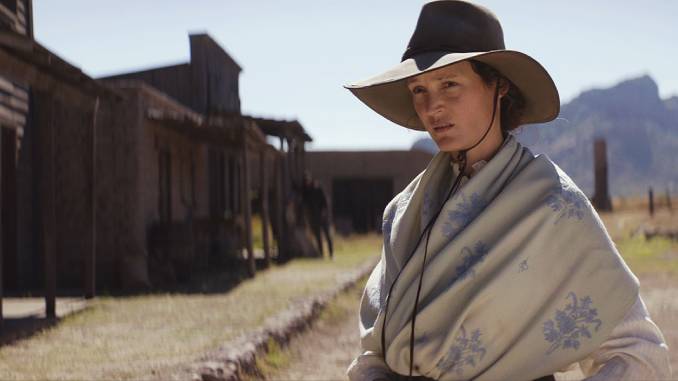Viggo Mortensen Western The Dead Don’t Hurt Isn’t as Feminist as He Hopes

Viggo Mortensen has been promoting The Dead Don’t Hurt, his second directorial project, as a “feminist western.” It is clear that no one on his team has informed him that a feminist western requires more critical thinking than simply putting a woman in a lead role. Filling your film with genre tropes without subverting them, or adding new ideas, is only that: Filling your film with genre tropes. The Dead Don’t Hurt is stuffed to the gills with western tropes, with not a whole lot to add to the genre, especially in terms of furthering feminism onscreen. It may not be the worst western in the world in terms of women’s rights, but that is hardly a reason to commend a film that’s only missing the whore with the heart of gold.
Mortensen stars as the carpenter Holger Olsen, a Danish immigrant who largely keeps to himself in his Nevada ranch house in the 1860s. Olsen’s lone wolf tendencies are tested when he instantly falls for Vivienne Le Coudy (Vicky Krieps), a flower seller living in San Francisco, herself a French Canadian immigrant. Le Coudy is seeing a rich aristocrat at the time, fairly seriously in fact, but she is the kind of independent woman who can’t be held down by any man, even a rich one. She refuses to wed, but agrees to leave with the cowboy Olsen back to his Nevada home. Soon, Vivienne is homemaking on his ranch. She grows roses and takes a job waitressing in the local tavern.
The couple’s new, idyllic life together abruptly ends when Holger feels compelled to join the Union Army as the Civil War explodes into a more fiery conflict. Why someone like Holger would be so bound to the idea of fighting an American war is completely beyond me. Perhaps to our modern sensibilities, joining the Union to fight against slavery makes sense, but this logic applies less to a solitary man of the time like Holger. He leaves Vivienne stranded in the Nevada town of Elk Flats, which proves itself to be more corrupt than she’d originally imagined. The mayor, Rudolph Schiller (Danny Huston), is intent on protecting his financial interests at all costs, even if that comes at the price of the safety of his citizens. This includes Vivienne, who is ruthlessly pursued by the mean-spirited Weston Jeffries (Solly McLeod), son of the mayor’s business partner, Alfred Jeffries (Garret Dillahunt). With no one to protect her, Vivienne must fend for herself. The story is told non-chronologically, beginning with the end, so by the time Vivienne is introduced, we already know her tragic fate.
Yes, Vivienne is a strong woman who stands up for herself in a crooked town populated with evil men, but her existence in The Dead Don’t Hurt is defined more by the lack of Olsen in her life, and by the presence of nefarious men who wish her harm, than by her own merits. She spends most of the film not fighting back, but pining for her man to return from the war (albeit, she does so with a brave look on her face). By its end, the protagonist’s arc is ultimately given not to Vivienne, but to Olsen, who must reckon with his decision to leave Vivienne to the wolves, and move on. The Dead Don’t Hurt is more about the effects of violence against Vivienne on Olsen, not on Vivienne, who is a character in Olsen’s story, not her own. This makes for a rather conventional western with regards to sexual politics, not a radical one.
-

-

-

-

-

-

-

-

-

-

-

-

-

-

-

-

-

-

-

-

-

-

-

-

-

-

-

-

-

-

-

-

-

-

-

-

-

-

-

-








































